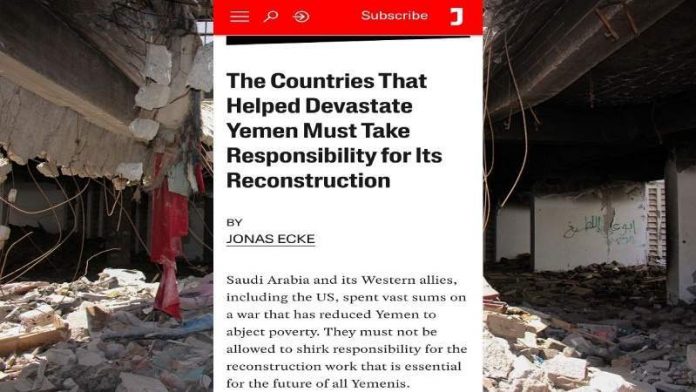An American magazine shed light on the destruction of infrastructure caused by the aggression against Yemen, stressing that the countries that helped destroy Yemen must bear responsibility for its reconstruction.
Jacobin magazine said: Saudi Arabia and its Western allies, including the US, spent vast sums on a war that has reduced Yemen to abject poverty. They must not be allowed to shirk responsibility for the reconstruction work that is essential for the future of all Yemenis.
wars continue to claim innocent lives long after the bombs have been dropped, missiles launched, and grenades thrown. Humanitarian aid in Yemen is dwindling due to ongoing allocations to Ukraine.
In February of this year, the UN’s Yemen Response Plan was only 10.4 percent funded. The destruction of infrastructure has impacted all spheres of Yemeni life in such a profound manner that it would require a genuinely ambitious reconstruction effort that exceeds the current underfunded humanitarian aid deliveries.
To alleviate the suffering in Yemen, Saudi Arabia and its regional coalition partners — including Bahrain and the UAE, as well as non-Gulf countries such as Egypt and Jordan — must be held accountable. The Gulf monarchies, which are responsible for the largest portion of the physical destruction and possess the necessary resources to rebuild, should bear the majority of the cost.
The United States, in particular, bears a special responsibility. Seventy-three percent of the weapons received by Saudi Arabia originate from the United States, and the United States took part in joint exercises with 80 percent of the air squadrons involved in Yemeni airstrikes. In addition, US military contractors provided repairs, maintenance, and spare parts, while US jets conducted midair refueling operations for Saudi planes that carried out the airstrikes.
In 2018, during a period of regular bombings in Yemen by Saudi Arabia, Bruce Riedel, director of the Intelligence Project at the Brookings Institute, gave the following terse assessment: without US support, the Royal Saudi Air Force would have been “grounded tomorrow.”
European Union (EU) countries, as major arms suppliers to the Gulf coalition, should also contribute to reconstruction. EU exports, particularly from the UK, Germany, and France, to Saudi Arabia and the UAE increased significantly during the war.
Western and Gulf countries alike are wealthy nations capable of funding reconstruction. Examples of their extravagant spending include the hundreds of billions spent on World Cup preparations in Qatar and Saudi Arabia’s plans for costly architectural projects. Rebuilding hospitals, water treatment plants, buildings, and roads in Yemen would be more than financially feasible for these nations.




















